Speakers
📢 Here are the current speakers we have for this event. We will also hear from you – the event is all about taking part.
How To Hire A Salesperson
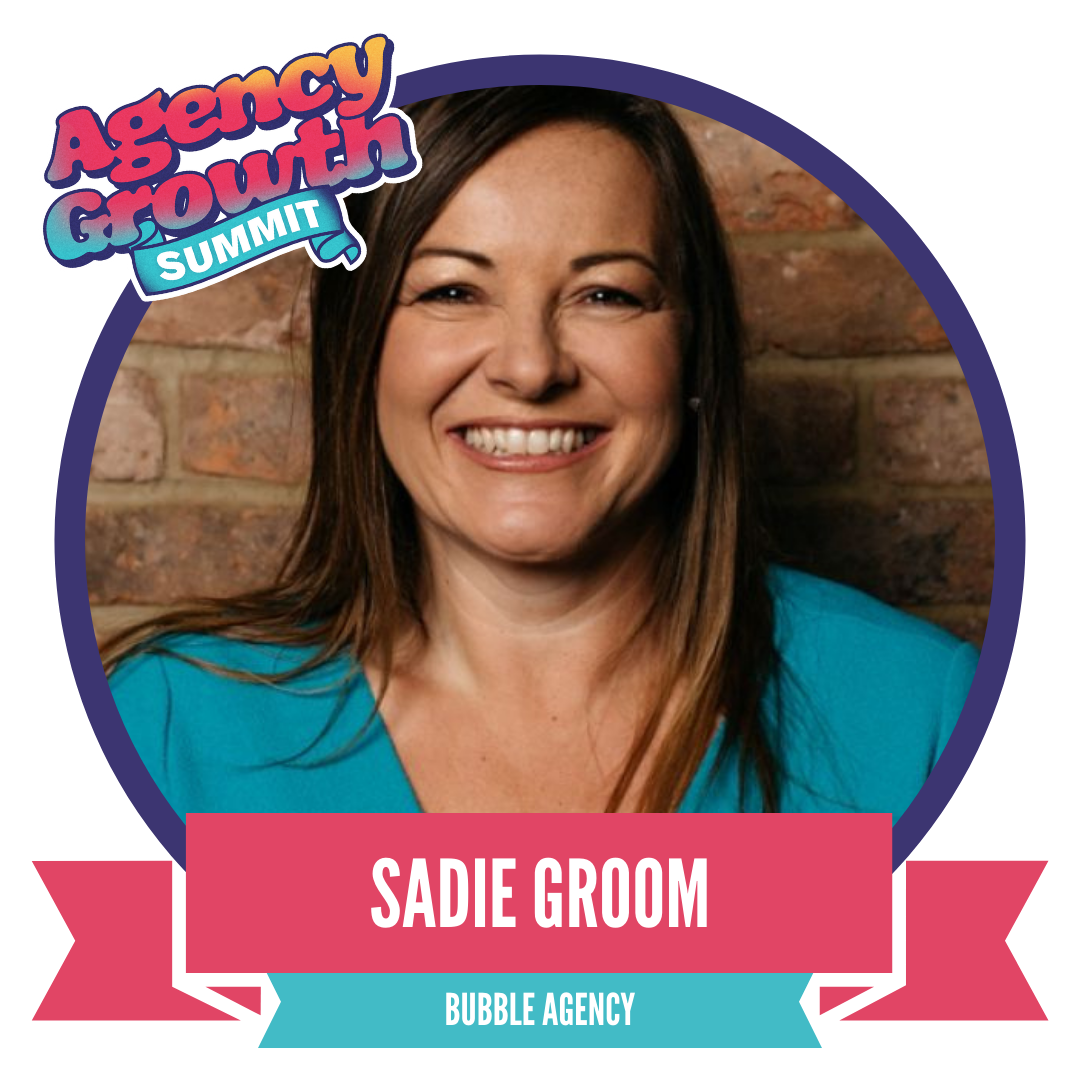
Head of Sales. Marketing Director. Biz Dev Manager. Do you know which one your agency needs?
For Sadie Groom, CEO of Bubble Agency, hiring an old-fashioned-style salesperson has been a total game changer.
“In PR agencies, it’s usually all done by the founders and associate directors. Before, new biz was very much dependent on my network and me being out there,” Sadie explains.
But founder-led sales and marketing can only go so far.
Enter Andrew, whose expertise in sales (think selling ads in the newspaper) has transformed new biz for Sadie’s agency:
- The immediate impact. Andrew’s expertise and proactive approach quickly led to a substantial increase of 17-20% in additional revenue for the agency.
- A difference in approach. “People don’t pick up the phone these days, but he’s not scared in any way to start a conversation with anybody, and on LinkedIn or email too.”
- The benefit of having someone in-house rather than outsourcing. “External agencies might take months to start producing results,” says Sadie. “With Andrew, we saw immediate action and a deeper connection with our company’s ethos and objectives.”
By having a salesperson on the team, it means things get done much quicker – and much more directly.
“We interviewed two agencies, and both of them said they’d be able to get us a meeting with a potential client after the first three months,” says Sadie. “But if I’m going to give you a list, you should be getting me meetings quicker than that.”
“We provided Andrew with a list of 400 companies and he got on with it straight away.”
At Agency Growth Summit, we’ll hear from Sadie about the transformative effect hiring a salesperson into a traditionally marketing-driven industry has had on her agency – and why it might stand you in good stead to do the same.
Our Journey to £1m in Profit
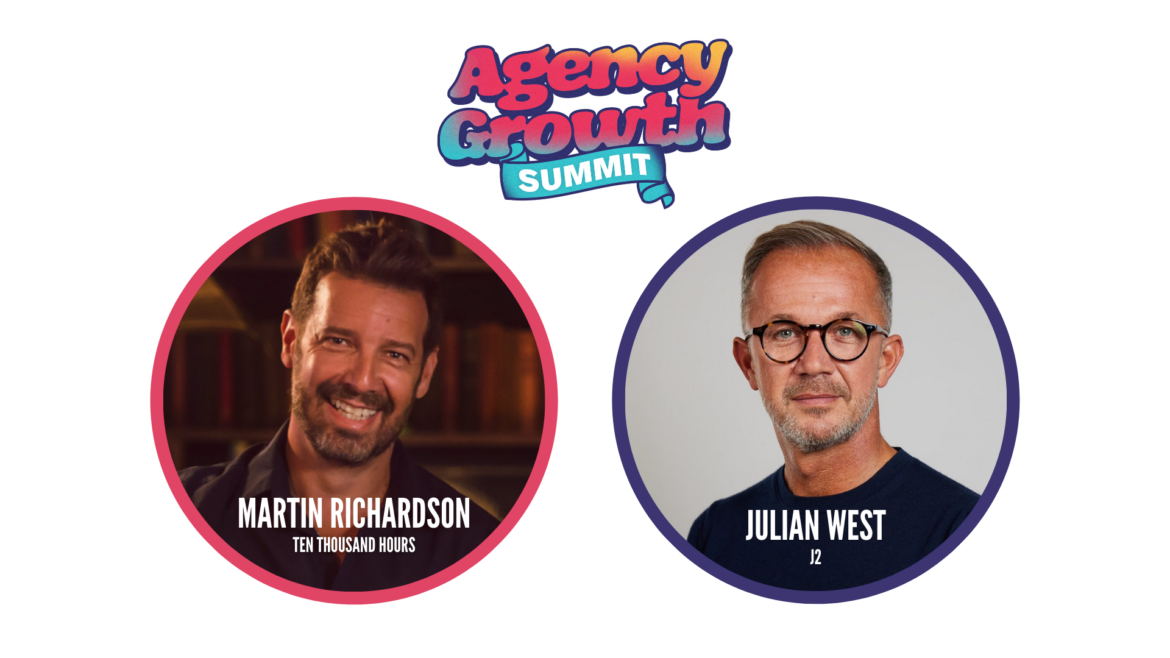
“We had no clients, no money, no office… absolutely nothing.”
Fast forward seven years, and for Martin Richardson, it’s quite the opposite: his agency Ten Thousand Hours is now making waves, including a whopping £4.2m in revenue, and £1m EBITDA.
But how?
- Overcoming initial obstacles. “We had a period at the start where we were reaching out to people, but no one was biting. When you get to six months with no clients, you start to wonder, ‘Have we done the right thing?’. Being bound by NDAs from their previous agency didn’t help… until they won a giant of a client in Google DeepMind.
- Adapting to change. Like everyone else, the agency was affected by the pandemic – but not in the way you’d think. The agency took a strategic shift from physical and virtual events to focus on engagement and unique value. It ended up being incredibly profitable…
- Winning the ‘right’ work. “Our success, strategically, has come down to us being financially astute, and understanding exactly what projects to work on,” says Martin.
- Prioritising added value over pricing. “Sometimes we can be seen as expensive, but we’re all about the added value, and challenging clients to help them be the best. We’re not just doing standard logistics, we’re contributing to their business growth plans,” says Martin.
At Agency Growth Summit, we’ll hear from two agency leaders who have achieved £1m EBITDA: Martin, and Julian West – CEO and founder of J2.
“It’s an algorithm, right? It’s not just one thing that makes you successful – it’s the component parts that all come together that make up the success,” says Julian. “Recruitment is, without question, the biggest factor in growth. When you do get exponential growth, but you get the wrong people, you go backwards.”
Julian also stresses the importance of maintaining a solid cashflow: “Cash is king. It gives you breathing space – as well as the ability to make investments without worry. If you can, underpay yourself for as long as possible.”
Join us as we hear from two very different agency leaders on how they’ve overcome the usual growth obstacles to success – and achieved over £1m in profit.
How ‘Stepping Back’ Can Help You Scale Your Business
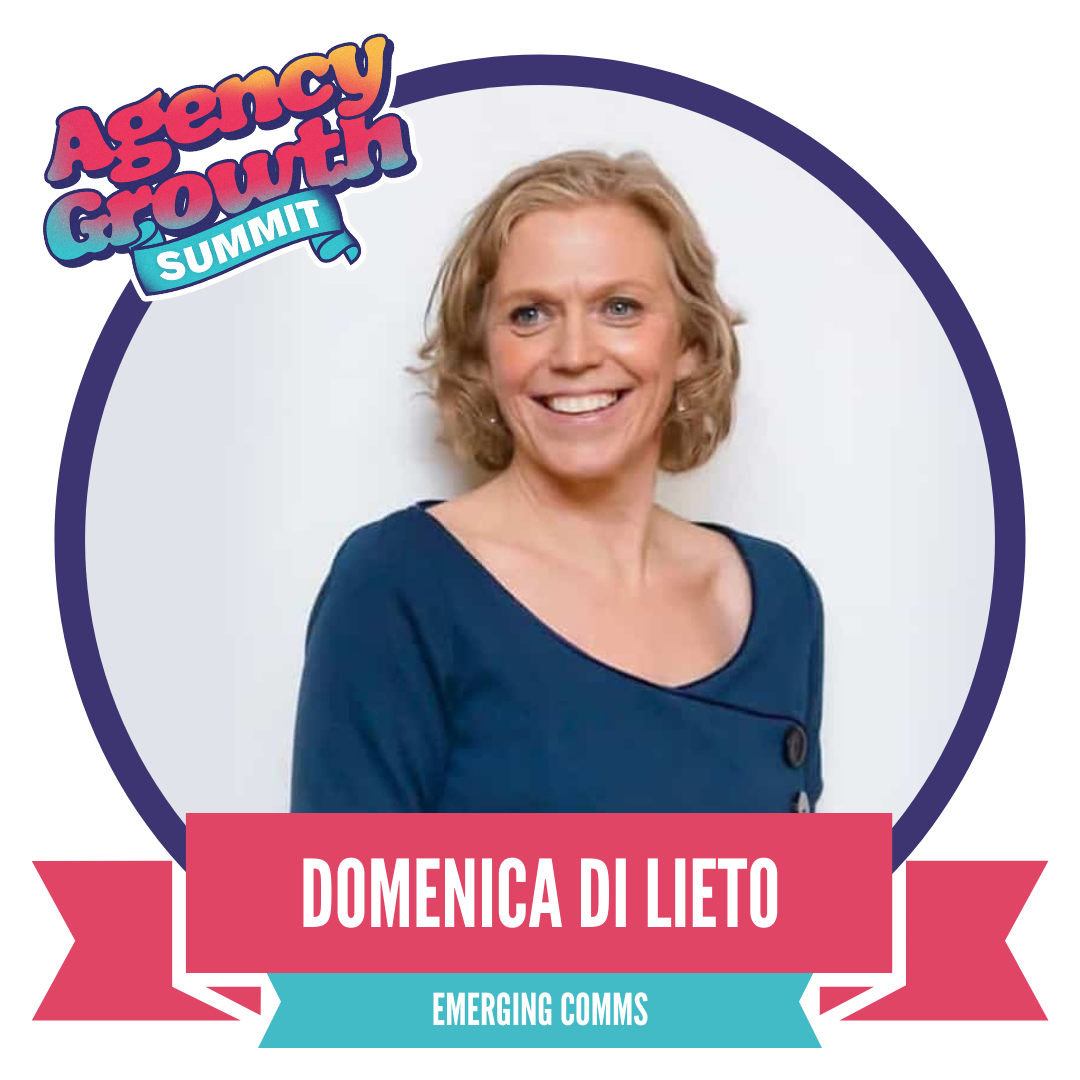
“For us, leads are coming in thick and fast – I had five last week and two yesterday,” says Domenica Di Lieto, CEO and co-founder of Emerging Communications.
There are all sorts of factors slowing down new business right now – everything from government legislation to longer sales cycles. But the biggest one is: nobody’s got any money.
So how is Domenica’s agency doing so well?
First and foremost, you’ve got to start delegating: “I’m always thinking, could somebody else do a certain task better? And if they can, I don’t do it. It’s that simple,” says Domenica.
“What I’ve done as a founder is create roles within a senior leadership team to take off the things I’m bad at. By doing that, when you have a hole in the business, you can then step into it – shape it, get it the way you want – and then you can find a leader for that division.”
Last year, Domenica brought on Stephen Pratley as head of marketing. With the agency’s marketing running smoothly in the background, Domenica can now focus her efforts on networking – which she says is the closest thing to a silver bullet you can get for new biz.
“Everyone is moaning about not getting enough leads – but they’ve been moaning for six months,” says Domenica. “Meanwhile, you haven’t left your office. You haven’t been anywhere. You haven’t seen anybody. You’re not doing LinkedIn. You haven’t spoken on stage or been on podcasts. You are not visible. There’s the answer to your conundrum!”
Domenica strongly believes referrals are king when it comes to new biz – and the easiest way to get those is by getting out and about.
“I did over 50 events last year,” she says. “Of course you still need marketing – you still need evergreen content, case studies, testimonials, events, and somebody’s got coordinate all of that.”
“But nothing takes place of building relationships, nothing. I believe that is definitely the only way that businesses are going to survive over the next couple of years.”
At Agency Growth Summit, Domenica will share how her agency is still raking in new biz leads in a turbulent market. She’ll discuss:
- The power of social media, networking and referrals
- Why you should be treating clients like friends
- How to position yourself in an oversaturated industry
All of which has led her agency to not only keep the lights on, but continue to grow as planned. If you’ve been struggling to keep your pipeline full, Domenica’s wise words are worth listening to.
How to Win Without Pitching

“There’s nothing more demoralising than working on something that’s never going to make it into the world. You’ve got all these people in your agency working stupidly late nights, all for the glory of the pitch which they still don’t win.”
It’s no secret that pitching is a headache for most, if not all, agencies. But what if there was a way to circumvent the entire process altogether?
That’s what Aaron Hutchinson did.
In 2017, Aaron discovered ‘Win Without Pitching’. Originally a book written by Blair Enns, the WWP is now a fully-fledged sales training company for creative firms – designed to shift the power dynamic between agencies and their clients.
It’s key principles are:
- Positioning – Focus on specialising in a particular market or service area, rather than trying to be a generalist.
- Lead with expertise – Instead of competing on price or through traditional pitches, focus on demonstrating expertise rather than just providing a service.
- Diagnose before prescribing – Engage in deep conversations with potential clients to understand their problems thoroughly before offering solutions, rather than pitching generic services.
- Price on value, not time – Shift from time and materials to value-based pricing.
- Saying no to the wrong clients – Don’t be yes people. Be selective about clients, turning down work that doesn’t fit your expertise or business goals.
All in all, it gives agencies a lot more control when it comes to winning work.
“We were really extreme; we said we were never going to pitch again,” says Aaron, the former global managing director of Across The Pond.
“You still engage in conversation with clients, but through your thought-leadership and demonstration of your expertise, it’s possible to win work without having to pitch and give away all of your value for free.”
You wouldn’t ask someone who builds houses to build three before you agree to go hire them, so why should this be any different?
But it’s not just about empowering the team.
Through adopting the framework, Aaron’s agency chose to specialise in AI and cutting-edge tech, meaning they could often bypass the traditional pitching process and still attract dream clients.
Combined with a value-based pricing approach, this helped them achieve some impressive growth: “In the first year we started the WWP framework, I think we calculated around $750,000 of extra revenue, just from pricing differently.”
At Agency Growth Summit, Aaron will be sharing his journey with ‘Win Without Pitching’. He’ll discuss how it helped his agency grow, lifted team morale, and how it could do the same for you too.
How Community-Based Marketing Can Help with Growth

“In both B2B and B2C, the power of community is undeniable. It creates a sense of belonging and trust that no amount of traditional marketing can achieve,” says Michelle Goodall, former CMO of Guild.
We humans are social creatures who thrive on being around others similar to us. Everybody wants to feel like they belong – and that’s why communities exist; they bring to us a sense of acceptance and inclusion.
When it comes to your marketing, creating and being a part of a community is the number one way to the hearts of people, suggests Michelle, as it encourages an ethical and organic growth strategy.
Not only is it a strategic approach to building a loyal customer base – it also benefits your clients.
It allows you to:
- Gain a firmer understanding of your audience
- Increase customer retention
- Improve customer engagement
“I believe community is the future of business,” says Michelle, who has had over 25 years of marketing experience in various sectors and industries and has built thriving networks with strategies focused solely on community.
Brands like GymShark, Starbucks, and Polaroid have all capitalised on their communities over the years, sustaining a strong relationship with their customers and turning them into advocates.
At Agency Growth Summit, Michelle will delve into how community marketing can help grow your business organically, and strengthen client relationships. She’ll take us through real-life case studies, and show you where to start one yourself.
Get Stuff Done with Design Thinking
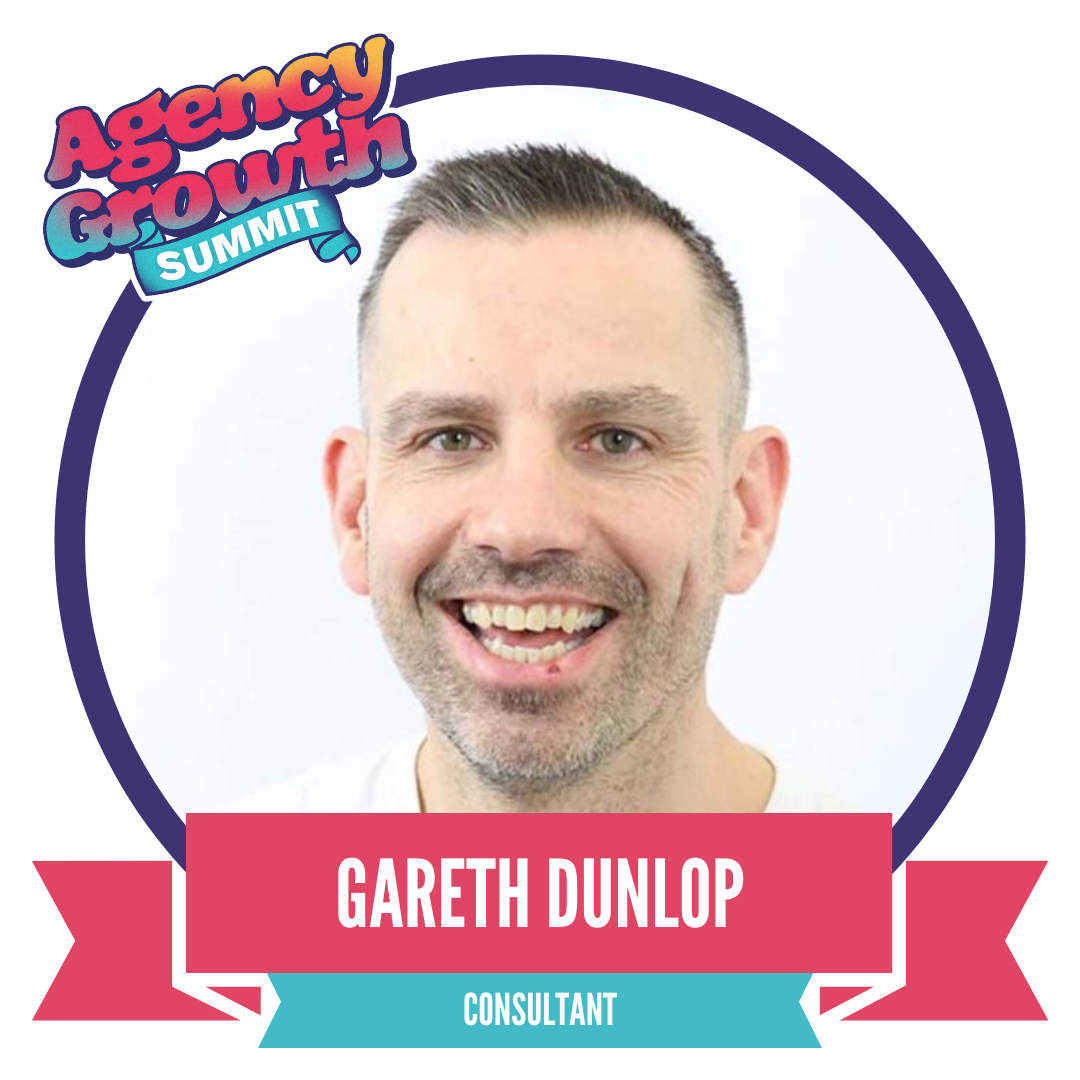
Your best ideas hit you when you least expect them. In the shower, walking the dog, on a beach in Ibiza.
But by the time you’re back in work mode, the idea has lost all momentum.
So how can you capture those gold star ideas and put them into action?
For Gareth Dunlop, the answer is ‘design thinking’.
“If you read Forbes or you read The Economist, very rarely is there an edition without some article on design thinking,” he says. “It helps busy stressed executives who are used to making decisions based on spreadsheets, and gives them a new way of framing how they solve problems.”
Design thinking is, in essence, a solutions-based approach to solving problems, drawing on practical, cognitive, and strategic procedures to get the best out of you and your team.
“Design thinking asks, is there something that designers have been doing forever, that business people can use as a means of business people being creative?”
“Are there ways that they think, or processes that they go through, that we could observe and bring into a business context?”
Gareth became a huge advocate for design thinking when he discovered it during his time as a UX designer. Over time he grew to understand just how useful a tool it could be for agencies.
“This is something that becomes increasingly natural to leaders the more you use it. “
At the Agency Growth Summit, Gareth will explore how agency leaders can use design thinking for translating ideas into actionable solutions, prioritising concepts, and navigating challenges throughout the innovation process.
We’ll talk about:
- The importance of design thinking in business innovation
- Investment strategy in ideas
- The culture and mindset that underpins design thinking
If you’re in need of a new way of thinking – or are looking to get your own great ideas off the ground – you don’t want to miss this.
Growing Accounts with Active Farming
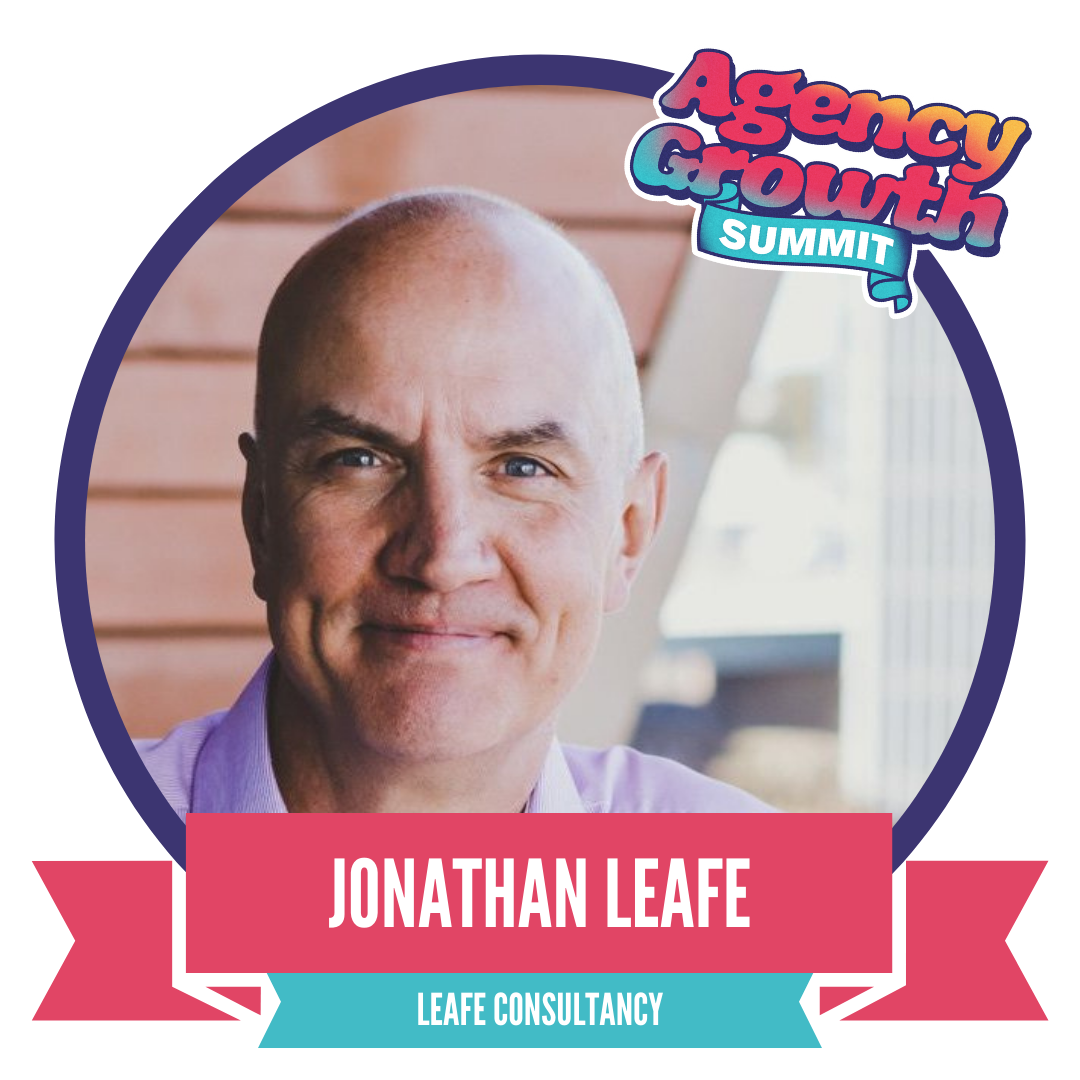
“It’s very common for those in agency land to love the thrill of the chase. But if you’ve got a churn rate of 30% and you want to grow your agency by 20% a year, you’ve got to get 50% new clients every year. It’s simple maths,” says Jonathan Leafe.
“You’ve absolutely got to hang on to what you’ve got. Once you’ve expended all your energy and resources on getting those new clients in, you should damn well hang on to them.”
When it comes to client work, Jonathan is a big advocate of an ‘active farming’ approach.
“I was reading an article by an agency coach who said he wanted agencies to be more hunters, and less farmers. The point he made was valid – making out that we get comfortable; we just look after clients, and that’s all we do.”
“But for me, that is absolutely the wrong way to approach it.”
What’s more important, and the key to success according to Jonathan, is making the most of the client relationships you’ve already got.
“If you had to go and find a new client from scratch, do cold calls, you’re going to spend a lot of time and energy before you even get to the start line – if you ever get there,” he says. “Most agencies will have the taps turned on full, with the plughole out. Clients get disillusioned, and suddenly, they’re leaving through the back door…”
“Whereas with an existing client, if you come up with a good idea for them, you can pick up the phone and set up a meeting – it’s that easy.”
“For active farming to work, you’ve got to have a really good offering and take new things to clients. You’ve got to be enlightening them with new possibilities they haven’t seen,” says Jonathan.
“It’s almost like putting pressure on yourself to find something the client needs – but they just don’t know they need it yet.”
At Agency Growth Summit, Jonathan will be taking us through the pros of this active farming approach, including:
- Why going out to win new biz isn’t the be-all and end-all.
- How he went five years without pitching for new biz, thanks to this approach.
- How and why you should identify clients that are naturally on the up – and how you can join them on their journey too.
Come along to hear more about this approach to nurturing client relationships, and how it could help you move away from a sole new biz approach.
How To Build A New Biz ‘Machine’
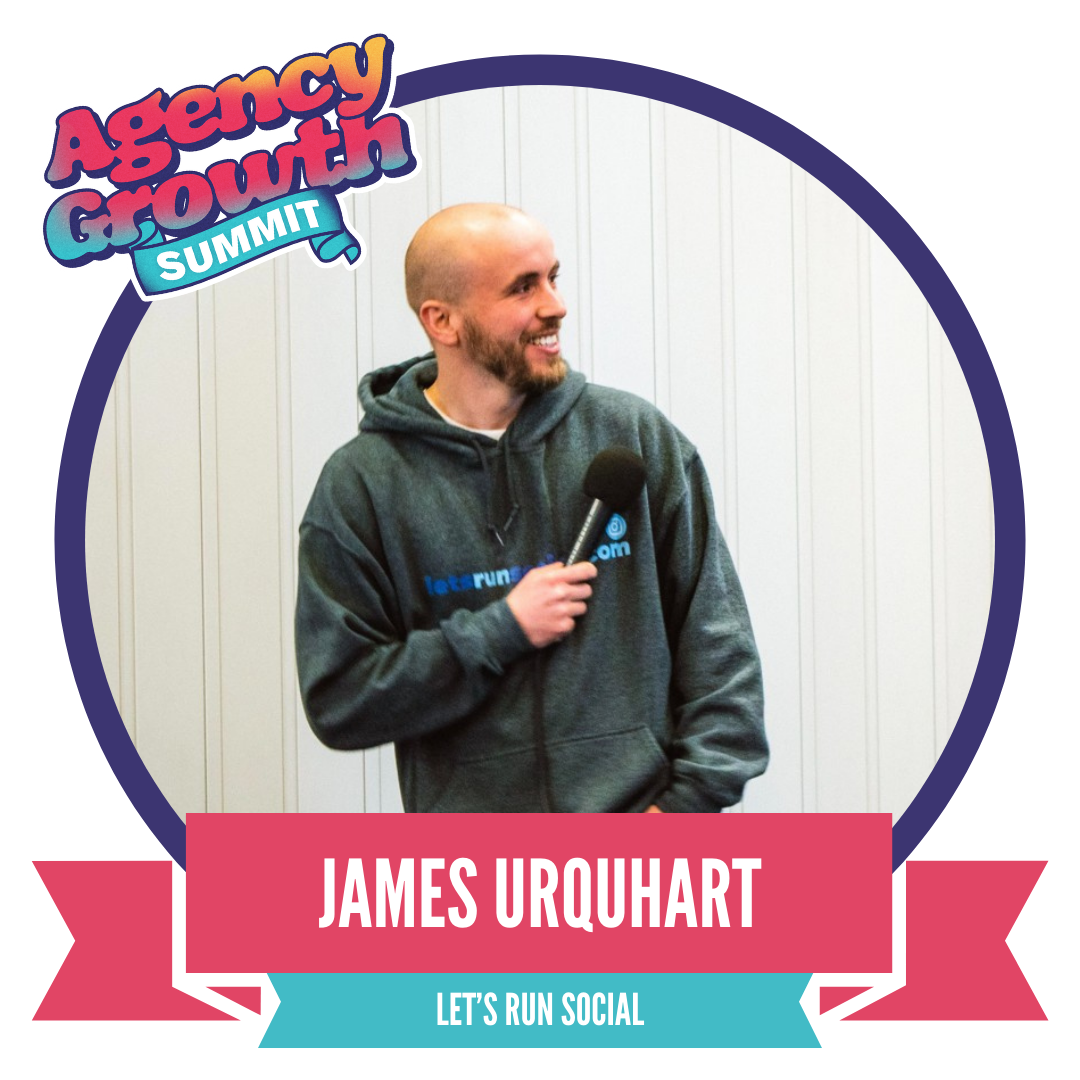
James Urquhart has an impressive approach to new business. He’s created a new biz ‘machine’ that runs like clockwork – something most agency leaders can only dream of.
“My background is in data sales, so everything we do is a sales enablement,” says James. “We’re basically always creating a case study for ourselves.”
So how does it work?
- It all starts with a podcast – “We’ve got the number one Facebook ads podcast in the world. That feeds into our ‘Ads Clinic’ because we’ve got adverts going, ‘Hey, do you want to help with your ads?’”
- The Ads Clinic – “The Ads Clinic is for businesses that can’t afford an agency yet. They still want to try meta ads, but they’re just not ready financially. So it’s a way to give people the expertise that’s required to run ads, but at a much cheaper rate.”.
- In the funnel they go – “Most clients stay on the Ads Clinic for about six months, then the ones that actually become bigger – they become agency clients.”
“We’ve got a vasectomy clinic in Australia that spends about £100k a year with us now. And that was all from a podcast lead to an Ads Clinic, to an agency,” says James. “That’s the good thing about the Ads Clinic – they could be anywhere in the world.”
On top of that, the agency also has another sales enablement podcast, is developing a SaaS tool to help brands manage their online communities, and is also acquiring another agency to fill a skills gap.
All these efforts combined has led to 300% YOY growth in revenue.
It’s quite the beast.
“Everyone goes in with this, ‘I want big, £100k-a-year clients’, but there are only so many out there. But if you can get in there like a little bullet hole, and then you just build it and build it – that’s a lot easier than trying to win Coca Cola against a load of agencies that you know you can’t beat.”
At Agency Growth Summit, James will be explaining the ins and outs of his triumphant new biz machine, and the principles that come with it – so you can look to build one of your own.
The Different Stages of Growth
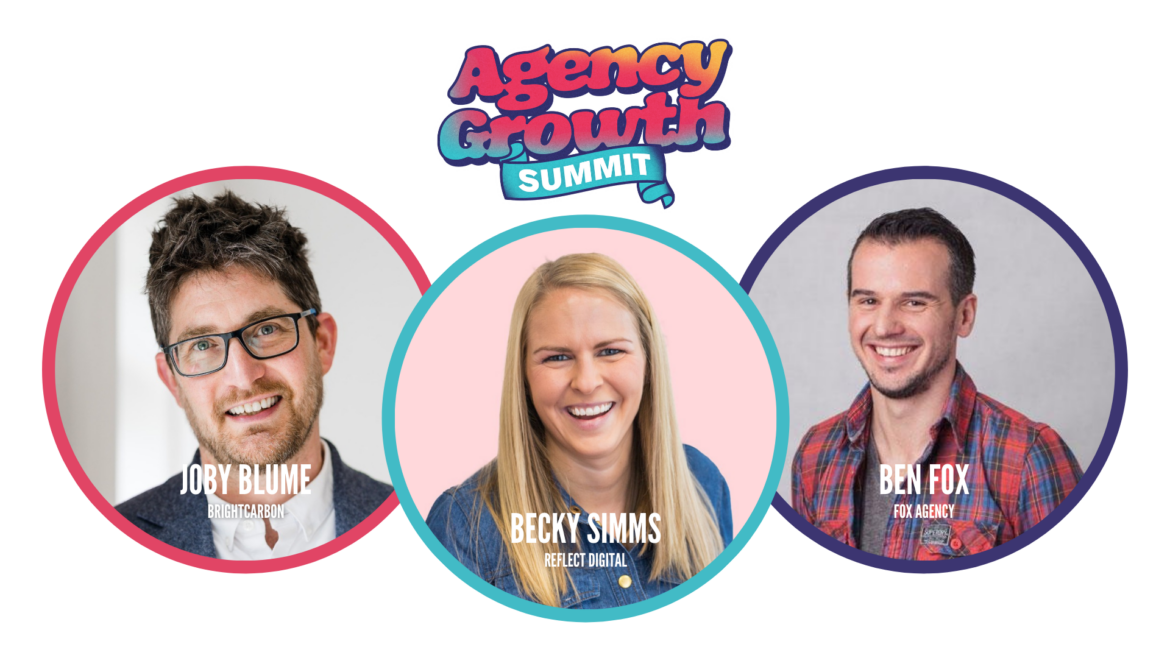
Growth comes in all different shapes, speeds and sizes.
When you’re dealing with something as complex as growing an agency, there’s no one-size-fits-all answer.
That’s exactly why we’re bringing in voices from different points on the growth path. Each leader on our panel brings a unique slice of the agency growth story, offering insights that are as diverse as their backgrounds.
Meet your panellists:
Becky Simms – CEO & founder at Reflect Digital.
Not every agency managed to make it through to the end of 2023. Maybe clients took too long to respond; maybe the competition was too much; or perhaps COVID was still lurking in the background.
Reflect Digital experienced all of this, and yet they somehow made it out the other side.
“2023 was probably one of the hardest years ever, but it ended with us making some of the biggest, most exciting decisions we’ve ever made,” says founder and CEO Becky Simms.
“I think one of the earliest lessons I learned in business was that you set the temperature for how people are feeling. If you’re visibly panicking, then they’re all going to feel the same way and that is going to impact their ability to do their best work. Whereas if you remain confident but realistic, then people are also going to feel the same way. Worrying won’t get you anywhere.”
Becky has been the architect of Reflect’s growth since 2011.
In 2019, Reflect Digital was acquired by LAB group. However, after some private equity deals fell through, Reflect Digital decided to exit Lab group in 2023 – with many of the group’s other agency partners following suit. In an unexpected turn of events, Reflect Digital ended up acquiring all the remaining staff and contracts from LAB group to form a new agency in December 2023. Not only has this ‘kept the band together’ for the LAB team, but it also allowed Reflect Digital to continue working on joint projects with their shared clients.
“No business is without its problems, it’s never a smooth road to growth,” says Becky. “Clients go and make unexpected decisions; they can be pretty erratic, especially in a volatile market like we have seen. You need to be prepared and know there’s always a way.”
Ben Fox – CEO & co-founder of Fox Agency.
Getting an agency to £1m in revenue can be a challenge – but the bigger challenge is what comes afterwards.
For Ben Fox, CEO of Fox Agency, it took six years to get to £1m and it wasn’t an easy process.
Everyone who’s ever started a business will absolutely understand:
“We had the usual trials and tribulations of a fledgling agency,” says Ben. “Feast and famine and everything that comes with it; robbing Peter to pay Paul; using your own credit card to fund payroll – and the rest of the joys that come in those early stages.”
When Ben finally made it to £1m, the ball seemed to be constantly rolling, with a growth rate of 40% year on year. Then COVID happened.
“We flatlined in 2020. But we did come out of it,’ he explains. “We came out of it a different agency with a different story to tell; a different look and feel, a different position. And I guess, when we look back at 2021, 2022 and 2023, we’ve done 40% growth year on year.”
Joby Blume – Director at BrightCarbon.
Joby Blume watched on as his previous employer sent their agency crashing into the ground.
Although it was never the plan, he realised it would be safer start his own agency with former colleagues, than go out on a limb and work for someone who might go bust again.
At least this way, he was in control.
“You see exactly what you shouldn’t do; you watch someone else make all the mistakes. We started with quite a good idea of how we wanted to be different, what we wanted to do when we set up an agency and sort of grew from there.”
Whilst some agencies are focused on setting up teams and processes for everything, Joby and his team at BrightCarbon went about it a little differently:
“We didn’t really have a sales team – we had one salesperson for a few years. We never had dedicated project management. We never kept timesheets. We never sold our time.”
So how did BrightCarbon grow to the level it’s at now, raking in massive seven figure clients from across the world?
Well, it mainly comes down to three things:
- Great content marketing: “Most of our competitors love us. We get referred work by people in our space that we’ve never met, just because we’re there providing content for everyone – including competition.”
- Making services easy to buy: “We don’t have salespeople. That means we need to make it super easy to sell. So we put our prices on our website: small, medium, large – which one do you want?”
- Niching down: “I’m sure some of our growth success is down to being very specialised and very niche. A lot of our clients that we started with on day one are still clients now.”
If you’ve found yourself dealing with the immense stress that comes with building and growing a business – this discussion could offer you the answers you’re looking for.
